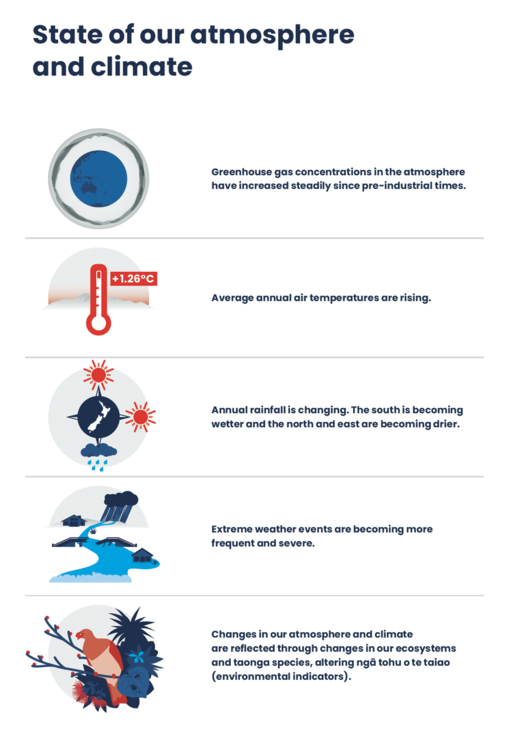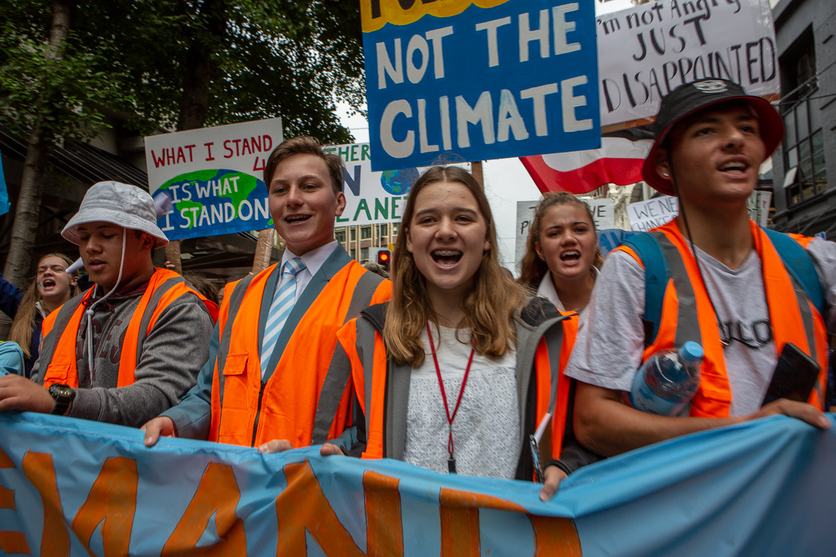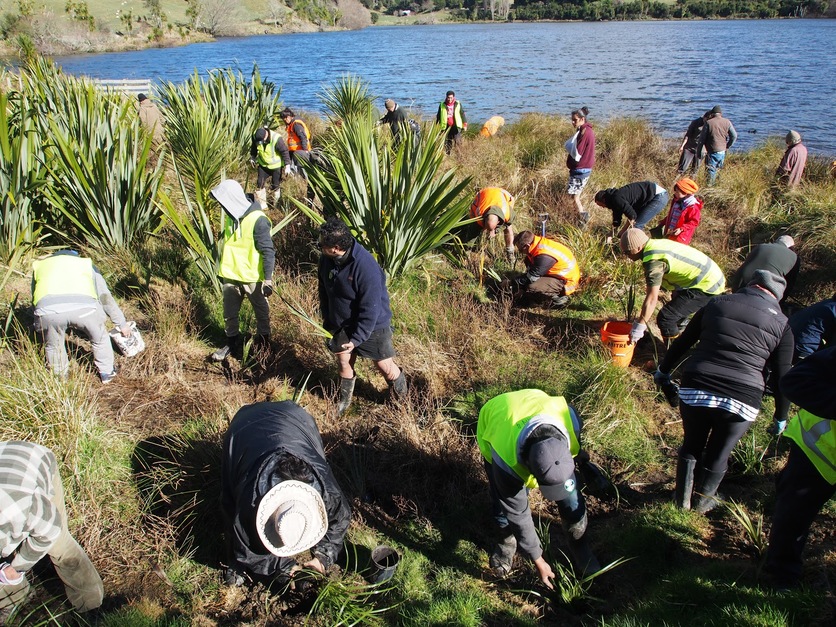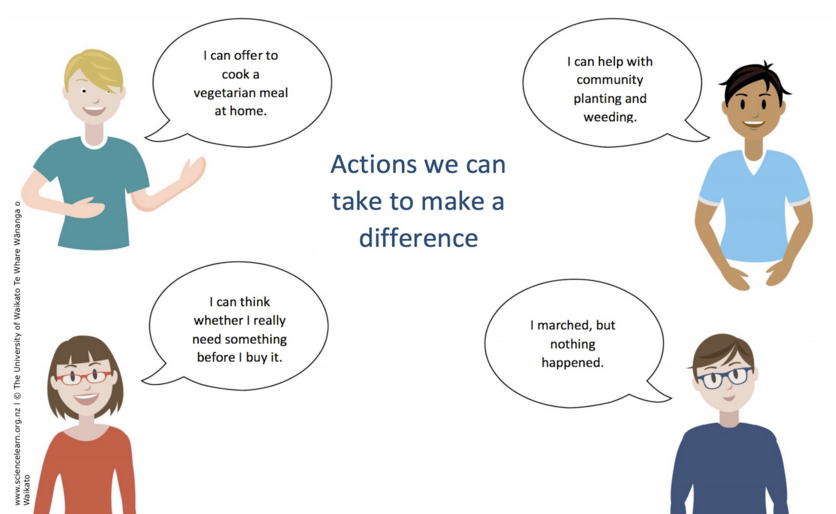Across the generations – and for young people in particular – climate change is recognised as the most important challenge that our world faces. Education is a critical agent in addressing this urgent issue.
Education can encourage people to change their attitudes and behaviour; it also helps them to make informed decisions. Education empowers all people, but especially motivates the young to take action.
United Nations Climate Action
Teaching in the Anthropocene – the era of human impacts
Since the 1950s, humans have fundamentally altered the Earth’s physical, chemical and biological systems at an unprecedented rate and scale. The Anthropocene is a new geological era that recognises the substantial impacts human activities are having on te taiao.
Educational research and thinking about science education in the Anthropocene identifies some key points to consider when helping to prepare ākonga for the complexities of climate change:
- Humans are inextricably linked to and part of the natural world – place-based, local curriculum is important.
- There is a need to consider and value multiple perspectives – science and mātauranga Māori are ways of making sense of the world and its complex interactions.
- There is a need for ethical considerations – social and climate justice recognise the unequal disadvantages of climate change for some peoples.
- Scientific literacy is needed to understand the complexities of interacting systems and to discern/counter misinformation and disinformation.
- There is a need to build students’ sense of agency so they are aware they have influence and can change things at local and higher levels.
- Educators need support to effectively address student understanding and engage them in positive action
Mō tātou te taiao ko te atawhai, mō tātou te taiao ko te oranga.
It is for us to care for and look after the environment to ensure its wellbeing, in doing so we ensure our own wellbeing and that of our future generations.
Te Mātaiaho and climate change education
Te Mātaiaho – the refreshed New Zealand Curriculum – aims to help ākonga build and navigate knowledge in ways that support their positive contribution to the world. It notes that learning has both participatory value and planetary value. The concept of mātaiaho – weaving within and across learning areas – affirms the holistic, interdisciplinary aspect of climate change education. Although the topic is firmly based within the sciences and pūtaiao, it draws on knowledge from the other curriculum areas and mātauranga Māori. The complexities of climate change require ākonga and educators to engage in systems thinking and develop capabilities and competencies across a wide range of disciplines and contexts.
Competencies for building agency
Agency in the Anthropocene (a supporting document to the PISA 2025 Science Framework) identifies and explains competencies ākonga require to address local and global challenges associated with complex environmental issues. The document notes that agency in the Anthropocene requires understanding that human impacts significantly alter Earth’s systems and that young people believe their actions will be appreciated, approved and effective as they work to mitigate these impacts.
People with agency in the Anthropocene:
- acknowledge social injustices
- demonstrate hope, resilience and efficacy
- respect and evaluate multiple perspectives and diverse knowledge systems
- demonstrate an ability to engage with others across generations
- work across a range of scales, from local to global, to understand and address complex challenges
- are action-competent.
The document has identified three key competencies for agency. A 15-year-old student who demonstrates agency in the Anthropocene can:
- explain the impact of human interactions with Earth’s systems
- make informed decisions to act based on evaluation of diverse sources of evidence and application of creative and systems thinking to regenerate and sustain the environment
- demonstrate hope and respect for diverse perspectives in seeking solutions to socio-ecological crises.
Resources to support learning and build agency
Of course, building these competencies can and should begin earlier! The following resources will help you get started. They are suitable for use with younger and older learners and include action and cultural competencies.
Background information:
- Our atmosphere and climate – introduction curates resources about human influences on the climate, how it affects the things we care about and how we know (the evidence).
- Environment Aotearoa 2022 – introduction curates resources about human impacts on environmental domains – using the whetū of Matariki as the context.
- Earth systems and climate change looks at our impacts on Earth systems from multiple perspectives.
- Climate change and impacts on biodiversity looks at threats to our unique ecosystems, including changes to species’ physiology, distribution and population dynamics.
- Utilising Our climate, our biodiversity, our future uses an interactive storymap that hosts a collection of stories arranged to show the interconnection of ki uta ki tai – mountains to the sea. The stories illustrate how the climate is changing, how it impacts our indigenous biodiversity, and what is being done to help.
- MethaneSAT – turning data into action tells about a joint American-New Zealand collaboration to detect methane emissions. The satellite is helping to slow emissions – right now – offering hope, agency and advocacy.
Pedagogical support:
- Climate change resources – planning pathways groups climate change resources into key science and teaching concepts.
- Climate change – a wicked problem for classroom inquiry has suggestions for bite-size inquiries – along with pedagogical support.
- Exploring climate change education in secondary schools and Exploring climate change education in primary schools webinars offer support on how to teach climate change.
- Agency in the Anthropocene article and presentation – provides current understanding and examples as well as exploring the PISA 2025 science framework.
- Climate data analysis – this activity uses Google Data Studio to enable students to visualise and filter datasets of interest.
- Consider building agency via inquiry and action learning with other environmental issues: water quality and stream monitoring, wetland (repo) restoration and smart water use.
Nature of science
Participating and contributing is an expectation at every level of the New Zealand science curriculum. At the earliest levels, ākonga explore and act on issues that link science learning to daily living. As they progress, ākonga are expected to explore socio-scientific issues, draw evidence-based conclusions, identify responses at personal and societal levels and take action where possible.
Content curation
The Hub has a wealth of resources on the topic of climate change – use the filters to narrow your search.
The Science Learning Hub team has curated collections of resources related to climate change, Our atmosphere and climate 2020 and Matariki and Environment Aotearoa 2022. Log in to make these collections part of your private collection – just click on the copy icon.
We have curated a range of supporting resources in this Climate change Pinterest board.
Useful links
Visit the Aotearoa Climate Education Coalition website. The What are we doing? page includes newsletters that summarise initiatives and events to inspire participation and action.
Use NIWA's serious game Township Flood Challenge. The game engages people in strategic thinking about adaptation actions as a result of climate change and extreme weather. The game is supported by educational resources that support learning about climate change, adaptation choices, wellbeing, values and decision making.
Watch the TED talk The satellite helping slow climage change – right now. The video has a focus on action.
Reference
White, P. et al. (2023). Agency in the Anthropocene: Supporting document to the PISA 2025 Science Framework. OECD Education Working Papers No. 297. OECD Publishing. https://doi.org/10.1787/8d3b6cfa-en.




